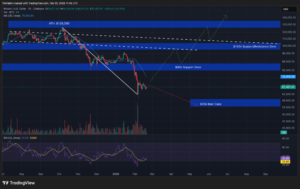Last updated:
 Why Trust Cryptonews
Why Trust Cryptonews
Ad Disclosure
We believe in full transparency with our readers. Some of our content includes affiliate links, and we may earn a commission through these partnerships.

Google has announced a policy update requiring advertisements for digital asset exchanges and wallets in the United Kingdom to register with the Financial Conduct Authority (FCA) before being allowed to run on its platform.
The new policy will take effect on January 15, 2025, the search engine company said in a recent announcement.
Under the updated rules, advertisers offering crypto exchange services or software wallets in the UK must meet specific conditions to promote their products.
UK Crypto Firms Need to Register with FCA
Chief among these is registration with the FCA, ensuring compliance with the country’s financial regulations.
Additionally, Google will permit advertisements for hardware wallets that store cryptocurrency private keys, non-fungible tokens (NFTs), or other digital assets.
However, these hardware wallet providers must avoid offering ancillary services such as buying, selling, or trading digital assets.
While the search giant did not provide additional requirements for hardware wallet ads, it emphasized that all advertisers must adhere to local laws in their targeted regions.
“As a reminder, we expect all advertisers to comply with the local laws for any area that their ads target. This policy will apply globally to all accounts that advertise these financial products,” Google said.
The new policy underscores the growing scrutiny of crypto-related advertisements worldwide as regulators attempt to curb misleading promotions.
In the UK, the FCA recently issued a warning about the Solana-based memecoin and NFT project “Retardio.”
The regulator flagged the project for unauthorized promotions targeting UK consumers, cautioning that investors might face financial losses if the company fails.
Elsewhere, Nigeria’s Securities and Exchange Commission (SEC) has also introduced stricter advertising guidelines for crypto products.
The SEC now requires virtual asset service providers and influencers to secure agency approval before publishing promotional materials.
As reported, a sponsored Google ad posing as a link to Sony’s blockchain project, Soneium, was exposed as a cleverly disguised crypto wallet drainer.
In October, a search for “soneium” on Google led users to a phishing site designed to steal crypto assets.
The ad linked to a website with a domain name similar to Soneium’s official site, which appeared as a legitimate yet unfinished landing page for a radiology service based in the UK.
In another incident, a fraudulent cryptocurrency wallet app on Google Play reportedly stole $70,000 from users in a sophisticated scam that has been described as a world-first for targeting mobile users exclusively.
The malicious app, named WalletConnect, mimicked the reputable WalletConnect protocol but was, in fact, a sophisticated scheme to drain crypto wallets.
The deceptive app managed to deceive over 10,000 users into downloading it, according to Check Point Research (CPR), the cybersecurity firm that uncovered the scam.
The scammers behind the app were well aware of the typical challenges faced by web3 users, such as compatibility issues and the lack of widespread support for WalletConnect across different wallets.

















